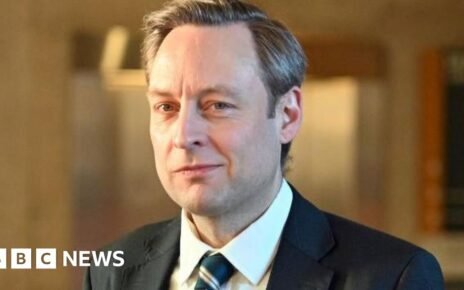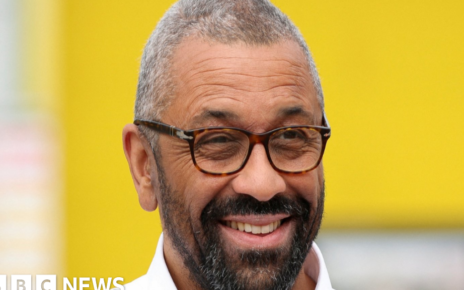[ad_1]
Paul Seddon,Political reporter
 BBC
BBCThe co-leader of the Green Party has told the BBC that finding different ways to measure economic success would help build a fairer society.
The party has long argued that economic growth drives over-exploitation of resources and should not be the default aim for governments.
Adrian Ramsay said relying on gross domestic product (GDP) to judge the state of the economy was a “blunt instrument”.
He added that a “wider range of economic measures” should be reflected when deciding what policies to pursue.
It marks a contrast with other political parties, which usually put their plans to boost economic growth front and centre in election campaigns.
Speaking on the BBC’s Sunday with Laura Kuenssberg, Mr Ramsay defended his party’s approach, adding they had a “strong message about the sort of economy we want to see”.
“The principle for Greens is that just using GDP as a measure of economic success is a blunt instrument,” he added.
He added that the statistic “doesn’t tell us about how unequal our society is,” or whether public services are working, or measure impacts on the environment.
“We need to have a wider range of economic measures which are about health and happiness, prosperity, jobs, public services,” he added.
He added that policies such as its proposed tax on the wealthiest 1% would help fund improvements to the NHS.
‘Consumerism’
The UK’s main GDP measure is produced by the Office of National Statistics (ONS) and tries to measure the overall size of the economy.
It plays an important role in deciding tax and spending decisions, because the government relies on official forecasts for GDP to work out which policies are affordable.
It is also expected to play a major role in the UK’s general election campaign.
Rishi Sunak cited economic growth figures in his speech announcing the poll, whilst Labour has made achieving the “highest sustained growth” in the G7 club of wealthy nations one of its five missions for power.
In recent years, a number of alternative measures have been developed that try to capture other aspects of the economy.
Since 2010, the ONS has also measured well-being, external alongside economic growth. This assesses health, relationships, education and skills, as well as people’s personal finances and the environment.
However, critics say GDP still occupies too important a role in debates about the economy.
In documents setting out their philosophy, the Greens say it promotes a focus on “consumerism” and other indicators would better capture the extent to which economic policies protect nature and improve well-being.

The Green Party of England and Wales is separate to the Scottish Greens, which stands candidates in Scotland.
It is aiming to run in every English and Welsh seat for the first time, requiring it to pick 103 more candidates than at the last election in 2019.
However, it is expected to focus on a small number of target seats, including the new seat of Waveney Valley, where Mr Ramsay is the party’s candidate.
Other targets include the new seat of Bristol Central, North Herefordshire, and Brighton Pavilion, where the Greens only current MP, Caroline Lucas, is standing down.
A full list of candidates will be available on the BBC website after nominations close on Friday 7 June.
[ad_2]
Source link freeslots dinogame telegram营销




